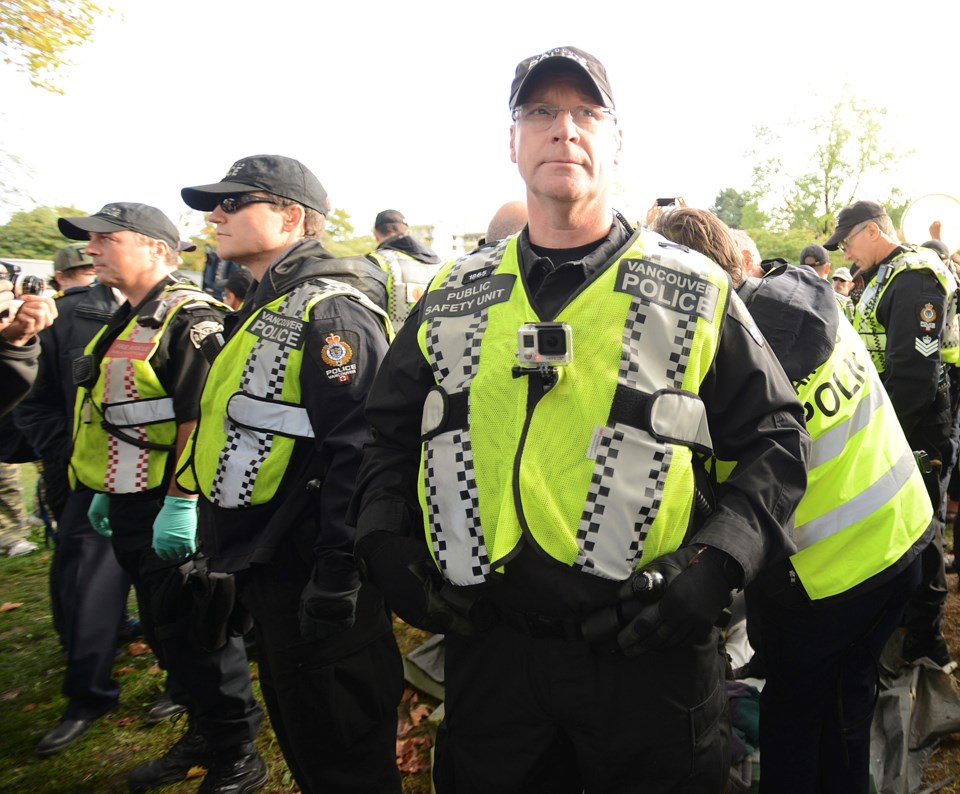The agency that investigates police incidents in B.C. involving death or serious harm says it could better resolve a significant number of cases if officers were equipped with body-worn cameras.
The Independent Investigations Office said in its annual report that footage from such cameras would have potentially assisted in 93 per cent of 71 investigations reviewed by the agency’s investigators. Of the 71 cases reviewed, 49 involved general duty officers, 17 were related to dog handler teams and five concerned emergency response teams and the Combined Forces Special Enforcement Unit.
“This review was initiated to determine in how many cases the availability of [body-worn camera] footage may have assisted the [agency] in either exonerating officers of the commission of a criminal offence, or in providing Crown counsel with sufficient information to ensure an appropriate charge evaluation,” said the report released this month. “In all firearms cases [of officer-involved shootings], [body-worn camera] footage would have assisted in providing additional independent evidence. Other video evidence [such as CCTV, video recorded by witnesses, etc.] was available in only 25 per cent of the cases reviewed.”
The agency’s report pointed out body-worn camera footage would have assisted in all 17 dog handler team cases it examined as part of the review. Aside from naming the Combined Forces Special Enforcement Unit, the report didn’t indicate which police forces were examined in the review, or the details of each case.
The Investigations Office’s findings come after Pivot Legal Society demanded last month that the provincial government release the most recent data on police dog use in B.C. and review how the VPD deploys its dogs. Pivot also wants dog handlers to wear body cameras.
“From our experience speaking with individuals bitten by police dogs, it is a common refrain that they maintain they were compliant and posed no threat when a dog was released upon them,” Pivot lawyer Douglas King wrote in a letter to Clayton Pecknold, the government’s director of police services. “We have also seen an increasing number of cases where the justification for the use of a police dog appears to be based solely on officer safety, with the dog being used as pre-emptive force before an individual resists or presents a threat. Body-worn cameras would make it easy to analyze whether or not VPD handlers are complying with the limitation imposed by the regulations, and prevent purposeful deployments against passive subjects, if they have in fact been occurring.”
The Courier reported earlier this month that 116 people were injured severely enough by the VPD’s police dogs this year that a trip to the hospital was necessary to treat the injuries, which ranged from small wounds requiring stitches to broken bones and ligament damage requiring surgery.
In response to Pivot’s call for body cameras, Sgt. Brian Montague, a VPD media liaison officer, told the Courier the department was not opposed to the concept. But, he said, the cost of setting up a new unit within the department, along with outfitting officers and purchasing new equipment, was estimated at $17.2 million.
VPD officers wore GoPro cameras as an experiment when they cleared the Oppenheimer Park tent city in 2014. Police wrote a report on the experiment, but it has not been released to the public. The VPD has eight GoPro cameras, which are worn by officers of the department's public safety unit during such events as the summer fireworks at English Bay.
In a report to the Vancouver Police Board in July 2015, the VPD warned that cameras “will not necessarily prevent a use-of-force incident.”
“The cameras will only provide some additional information, after the fact,” said the report, noting cameras will not improve an officer’s ability to “effectively de-escalate a potential mental health crisis.”
A statement from the provincial Ministry of Public Safety and Solicitor General to the Courier this week said the government continues to research the use of cameras and consult with police, local governments and the Office of the Information and Privacy Officer about whether they should be implemented in B.C.
“The research revealed complex technological, policy and legal issues respecting data management, threshold-of-use and privacy which require careful consideration, as do cost and data management issues,” the statement said. “The ministry will continue to look at how the cameras may support policing and public safety, and will be developing standards for their use. No decisions have been made at this time, and we do not have a date when this work will be completed.”
Meanwhile, the Investigations Office issued a plea this week for the public to turn over any video of the Nov. 10 shooting outside a Canadian Tire store on Grandview Highway, where a VPD officer shot and killed a man in what appeared to be a botched robbery. A store clerk and an officer were stabbed in the incident. The B.C. Coroners Service identified the 38-year-old man as Daniel Peter Rintoul of Vancouver.



